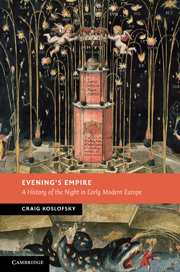Book contents
- Frontmatter
- Contents
- Figures
- Maps
- Acknowledgments
- Chapter One An early modern revolution
- Chapter Two Darkness and the Devil, 1450–1650
- Chapter Three Seeking the Lord in the night, 1530–1650
- Chapter Four Princes of darkness: the night at court, 1600–1750
- Chapter Five “An entirely new contrivance”: the rise of street lighting, 1660–1700
- Chapter Six Colonizing the urban night: resistance, gender, and the public sphere
- Chapter Seven Colonizing the rural night?
- Chapter Eight Darkness and Enlightenment
- Chapter Nine Conclusion
- Notes
- Bibliography
- Index
Chapter Five - “An entirely new contrivance”: the rise of street lighting, 1660–1700
Published online by Cambridge University Press: 05 August 2013
- Frontmatter
- Contents
- Figures
- Maps
- Acknowledgments
- Chapter One An early modern revolution
- Chapter Two Darkness and the Devil, 1450–1650
- Chapter Three Seeking the Lord in the night, 1530–1650
- Chapter Four Princes of darkness: the night at court, 1600–1750
- Chapter Five “An entirely new contrivance”: the rise of street lighting, 1660–1700
- Chapter Six Colonizing the urban night: resistance, gender, and the public sphere
- Chapter Seven Colonizing the rural night?
- Chapter Eight Darkness and Enlightenment
- Chapter Nine Conclusion
- Notes
- Bibliography
- Index
Summary
On April 26, 1784 the Journal de Paris published a letter on daylight and darkness from an anonymous subscriber. The author of the letter described an evening spent at a salon “in grand company” discussing, among other things, the new Argand oil-lamp. After considering whether this lamp would burn more efficiently and reduce lighting costs, the author returned home and went to bed “three or four hours after midnight,” reflecting a daily schedule typical of persons of quality in the eighteenth century. With generous satire the author, who was accustomed to sleeping until noon every day, related his surprise upon discovering by accident the next day that the sun actually rises between six and eight in the morning (!) and that it “gives light as soon as it rises.” Titling his letter “An Economical Project,” the correspondent urgently sought to enlighten the journal’s readers, “who with me have never seen any signs of sunshine before noon” that they could save vast sums on lighting simply by rising at dawn and having “much pure light of the sun for nothing.”
The author of this “Economical Project” quickly revealed himself to be Benjamin Franklin, representative of the new American republic in France. His comments, which developed into the idea of daylight savings time, call our attention to the importance of nocturnal sociability in the last years of the Old Regime. They were echoed in much more critical tones by his conservative contemporaries in Italy, who complained that even the common people “profane the night either at long theater shows or at continual debaucheries” and noted that “people stay up so much later and longer that they then have to restore themselves by resting until very late the next day.”
- Type
- Chapter
- Information
- Evening's EmpireA History of the Night in Early Modern Europe, pp. 128 - 156Publisher: Cambridge University PressPrint publication year: 2011
- 1
- Cited by



